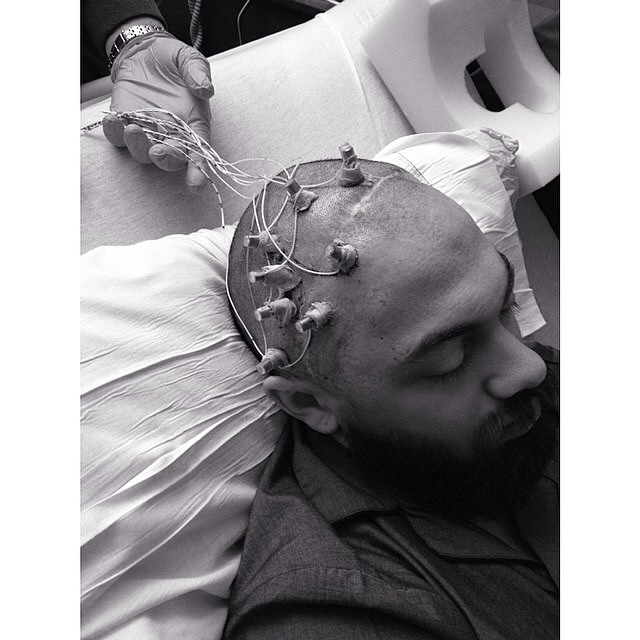An Epilepsy Journey

Beating the odds with Epilepsy
STORY BY Rhonda Till
My son Riley is turning 28 this month. He’s also celebrating 3 1/2 years seizure-free. The seizures began when he was 7. It’s been quite a ride for our family. Riley is my youngest of 3. He has a sister, Katie and a brother, Tyler. His dad, my husband, is Randy.
I wish I had known more about epilepsy and seizures when Riley’s started, but it’s just not something you know much about until it affects you or someone you know. The one seizure I had witnessed prior to Riley’s was in my teens, a person lying on the ground unconscious with her body shaking uncontrollably. I now know that seizures are not one size fits all. I know that seizures have different characteristics depending on the part of the brain they originate from. I know some seizures can be controlled and some cannot.
In Riley’s epilepsy story, it sounds like it was just the two of us. It wasn’t. This was a family affair and it involved all of us but we were always supportive of one another. I had the guilt of not being there for my other 2 children as much as I would have liked at times. Luckily, we had a wonderful extended family and the best friends we could ever ask for helping out at every turn. The biggest worrier was probably his big brother. The seizures were a part of all our lives and we dealt with in the best way we could.
Riley is a strong-willed person. The seizures rarely held him down. He played with the neighborhood kids, he went on sleepovers. It’s really crazy to look back at how everyone around him just dealt with it. He would go to a friend’s house to spend the night. I would pack his medicine and if he had a seizure, he knew what to do and so did the people around him.
During Riley’s last EMU stay and his surgery, Riley had a fantastic nurse, Michael, that the whole family loved. He and Riley had a lot in common and we’d sit in the hospital room and talk. About a year and a half after the brain resection, Riley went to an Epilepsy Surgical Reunion where Michael was recognized for his dedication and the impact he’d made on his patients. Afterwards, Riley decided he wanted to follow in Michael’s footsteps and become a nurse. Riley is now a CNA working on the neurology floor at Baptist Hospital. Sometimes he works in the EMU and enjoys talking to other epilepsy patients. I’m a very proud mama.
This is Riley’s ‘Epilepsy Story’…
Riley started having seizures when he was seven years old. This was 1997. We didn’t know they were seizures. I called them ‘giggle fits’ because it was like, out of nowhere, he would start giggling. He couldn’t help it. He would slap his hand over his mouth to stop. We all thought he was laughing at something. He wasn’t, it was just happening. They progressed slowly into some other little movements and verbal tics. I had no idea what was going on so I took Riley to his pediatrician. Riley had an episode in the exam room but the doctor didn’t notice it as being anything unusual. However, he did refer us to a neurologist.
Over the next several months, we saw 4 different neurologists. The seizures had stopped prior to seeing the first doctor so all he had to go on was my description what was happening. He seemed to think that Riley may just be a little hyperactive.
The seizures returned and we saw a second doctor. An EEG was ordered. He found nothing abnormal. Riley did not have a seizure during the EEG. The seizures were increasing. This doctor thought maybe Riley was faking the episodes for attention. I won’t even go into my reaction but we did not see this doctor again.
We were referred to another neurologist. This doctor wanted to do a sleep study, which we did. This resulted in being referred to an ENT. This neurologist felt Riley’s tonsils and adenoids were interfering with him not getting enough oxygen to the brain. Tonsils and adenoids were removed. Seizures continued.
I sought out another doctor. An EEG was done. He was given a different drug. We still were not given a diagnosis. His seizures increased. The decision was made to admit him to the hospital. The episodes continued until Riley was anesthetized for a PET scan. The anesthesia broke the cycle. The seizures dramatically decreased. After a week in the hospital he returned home on medication having 3 to 4 episodes a day and they eventually stopped for awhile.
Riley went through third and fourth grade with with very few seizures. Riley started fifth grade and his teacher noticed some problems with concentration. He began having more and more episodes, mostly at night. I spoke with the doctor. His medication was altered. The episodes increased. I was in touch with the doctor almost daily. Then I was told by the doctor to give it some time. I did not feel this was acceptable.
I don’t remember exactly how, I might have just opened the phone book. I could have searched on the computer. But I ended up with the phone number of the Neurology Department at Wake Forest Baptist Hospital. I called and by some miracle found myself on the phone with a nurse. I told her my son had been having some sort of episodes, off an on, since he was 7. I asked her if someone there could please help. I asked if I could get an appointment or if someone could just look at his medical records and give me an opinion. We got an appointment for a few days later. While there, Riley experienced an episode. For the first time, this doctor used the word ‘epilepsy’. The doctor asked if I would be willing to have Riley admitted to the Epilepsy Monitoring Unit (EMU). Luckily, a bed was available and we went straight there.
The first thing they did in the EMU was put electrodes on Riley’s head for an EEG. Then he was taken to a room where his seizures would be videoed. They began gathering information quickly with Riley’s seizures being so frequent. Other neurological tests were done and in five days he was released with a diagnosis of frontal lobe epilepsy. He went home taking two medications and the seizures lessened considerably.
By January (2001), the seizures were increasing again. The doctor tried various medications without success. School started in late August. Riley started school but his seizures were getting worse and he was seizing at school After a couple weeks, the decision was made for Riley to stay home. During this time, Riley had a cluster of seizures that ended with a grand mal seizure. This was the first time he had lost consciousness and as scary as things were up to this point, I became unraveled. An ambulance was called and Riley was in the hospital for a few days.
It was around this time that the doctor mentioned admitting Riley to the EMU again. He wanted find out if Riley was a candidate for surgery to possibly remove the focal point of his seizures (a brain resection). If not, maybe a Vagus Nerve Stimulator (VNS). He was admitted shortly before Thanksgiving and the EEG did indeed show a focal point. He would need to be admitted again at a later date for more extensive testing which would involve a surgery.
On January 8, 2002, Riley was admitted to the EMU. Grids with electrodes were placed directly on his brain on January 9, 2002. It was a 7 hour procedure. The monitoring began but the information wasn’t as good as they wanted. The placement of the grids needed to be changed. This required a second surgery lasting 4 hours. The monitoring began again. Information was gathered and we waited.
Several days later, we met with Riley’s doctor. After a meeting of a team of specialists; Riley’s neurologist, other neurologists, neurosurgeons, epileptologists, etc., it was decided that the odds were not in Riley’s favor for a resection. A VNS was recommended.
Riley was taken to surgery a third time to remove the grids and for the VNS implantation. On January 24th, Riley returned home from the hospital. He returned to school and caught up with the rest of his class.
For the next several years, Riley did well. He did have some seizures but they were manageable with the VNS and medication. When the battery of the VNS would begin to die, his seizures would increase and he would have outpatient surgery to get a new battery. This was done a few times.
In 2013, the seizures increased and became much more intense. Riley’s medication was adjusted, the VNS was checked and was fine, medications were added. Nothing was helping. An EMU admission was suggested and Riley was admitted. After several tests; EEG, MEG, SPECT, etc., it was suggested that we try to find that focal point again. There was a new procedure that could provide more precise readings than the previous grids. At this point, Riley is an adult. The decision was not mine to make so we collaborated. The statistics being given us by the epileptologist was a 30% chance of a 50% reduction in seizures. Those don’t sound like great odds but Riley made the decision to move forward with the new procedure, a Stereo EEG.
On March 26, 2014, Riley checked in for surgery. The neurosurgeon implanted approximately a dozen depth electrodes into the area of the brain where other tests had showed the seizures were originating from. Hours later, he was taken to his room. Monitoring began the next day.
When the team of doctors gathered this time to review the findings, a resection was recommended. A little anxious but also relieved and hopeful, Riley returned to surgery on April 2 to have the electrodes removed along with the focal point of his seizures, a section of his right frontal lobe.
After surgery, Riley was taken the the ICU to be monitored closely. We watched and waited. No seizures. No deficits from the surgery. Late the next day he left the ICU for a regular room. The day after that he went home. Three years and six months later, no seizures. He remains on a low dose of one medication.
WORDS FROM RILEY
First and foremost, going through with the brain resection was absolutely the best decision i’ve ever made. Even with the odds stacked against me, in my eyes there was no other option.
As I read over everything my mom has written, I don’t remember most of it. All I recall is never letting epilepsy control my life. Sure, it set me back in certain areas but it never defined me as a person. Which is kind of ironic that despite that, it’s changed the course of life. After meeting so many incredible nurses and doctors what helped me along the way, I can’t imagine spending my life any other way than trying to help others in similar situations. Epilepsy sucks. It would have been very easy to give up and pity myself but I never did. I think it’s important that I share my story with others and remind them to be strong and not let it control who they are.











Leave a Reply